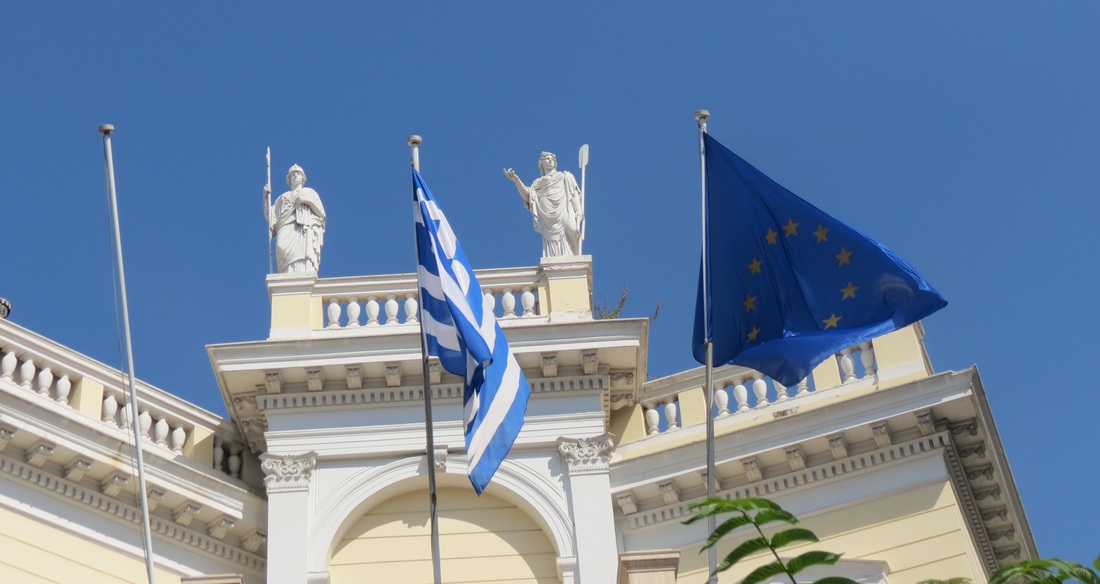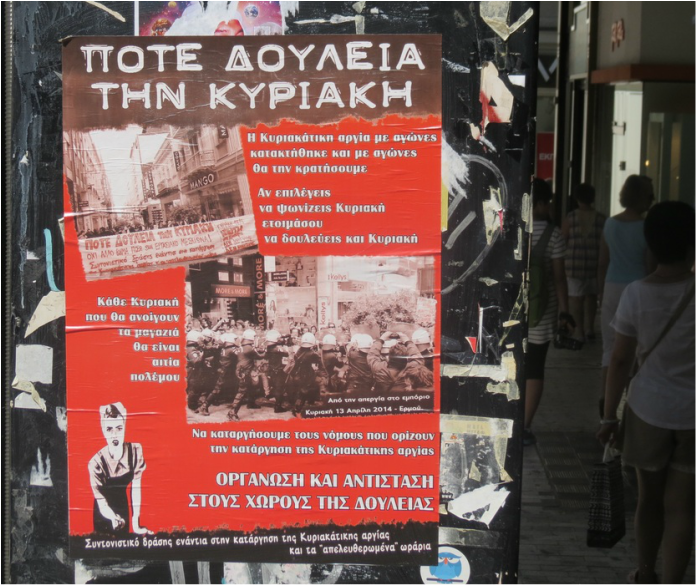|
Last summer we visited Athens and in making the bookings for our stay made sure we would be close to the city center and through Airbnb found an apartment in swanky Kolonaki. Surrounded by government offices, diplomatic missions and the residences of those that occupied these buildings during the day, we enjoyed the location’s many advantages including the daily stroll to Syntagma Square in the heart of the city. On one of the late night walks back, my daughter pointed to the green areas surrounding the various Greek government buildings. It was hard to discern immediately in the dark, but if you looked well enough you would see armed soldiers in full battle dress guarding the area, hiding in the park bush. It was sort of a shock to see this level of military presence and it complemented the many heavily armed police officers we had seen not only in our neighborhood, but also in many other locations in the city. Not exactly the signs of a stable democracy with a confident government. Of course we knew all too well that the European Union's austerity program had created political instability in Greece, but we were still somewhat surprised to see this level of security around town. And it was not just to ensure safety in Athens’ political and diplomatic quarters, on one Sunday we ran into a noisy demonstration of activist youths who ran down Ermou Street ensuring that all stores closed as rapidly as they demanded in order to ensure that none would be open for business on Sunday. Noisy, borderline violent and intended to be disruptive, it underlined the tension in Athens. It was not easy to explain this to our North American kids, but yes, in certain quarters of Europe the right to a day off for workers on Sunday is seen as fundamental, and to fight for it is taking a stand against capitalism, or as it is now often labeled, ‘neo-liberalism’. The government buildings in our neighborhood were adorned with both the Greek and EU flags. Combined with the armed police and the especially heavy security presence around the German embassy our quiet neighborhood walk presented us with the microcosm of Greece’s political reality in the summer of 2014. No longer sovereign and with a supranational entity enforcing both economic terms and identity, neither of which could be delivered without a heavy dose of armed protection. It gave me, in the very summer that marked the 40th anniversary of the end of Greece’s military junta a somewhat uncomfortable feeling. Was this the reality of what Greece’s journey to democracy and wealth had run into?
Now, the general train of thought is that Greece’s government was compelled to sign up for an economic austerity pact with the EU and its main enforcer, Germany, in order to keep the country closely tied into the Eurozone and ensure a measure of economic stability. It would align the Greek economy with that of the rest of the EU, its internal free market and monetary system as mandated by Europe’s central bank the ECB, at a cost to the average Greek citizen of course. Left of center opposition to the austerity so imposed has always conflated the EU with ‘neo-liberalism’ or the tendency to suppress local and individual interests to a multinational corporate and low tax agenda. This is interesting as the EU has been given many labels, but it is hard for true free-market conservatives or classic liberals to view this pan-European arrangement as something that would ultimately liberate markets and societies. Remember Margaret Thatcher’s deep distrust of the organization which still carries a lot of weight today and likely will keep Britain forever out of the Eurozone project. As it can be debated whether opposition to EU and its austerity measures is defined by leftist or right-wing sentiments, it would be safer to characterize this resistance as populist with nationalist undertones. As such these feelings feed into political streams that oppose the political establishment and in Greece this was channeled by two new movements, Syriza on the left and Golden Dawn on the right. Last night Syriza booked a spectacular election win in Greece’s parliamentary elections and will now with a clear mandate challenge the austerity measures imposed by the EU. Greece has a deep leftist tradition and it was only logical that a reinvigorated left would channel Greek discontent, promising that change is on the way. Syriza’s leader Alexis Tsipras now has a mandate deliver on a renegotiation and see if Greece can get out or relax the terms of its Eurozone straightjacket, the consequences of which no one yet can really oversee although there are many different scenarios that now carry the name ‘Grexit’. I would suggest to not bother with the 'market commentators' as no one really knows. What is clear is that Syriza’s win will have a profound effect on Greece and will no doubt inspire other EU-skeptical movements, both left and right, all across Europe. What the election results above all underline is that the existing order in Europe is under pressure and that the rules of engagement are now being rewritten. Whatever Tsipras’ ability to effect such change, the blue colored and star-studded EU flag may not fly as confidently along Greece’s white and blue as it has in recent years.
0 Comments
|
Archives
April 2020
Categories
All
|


 RSS Feed
RSS Feed